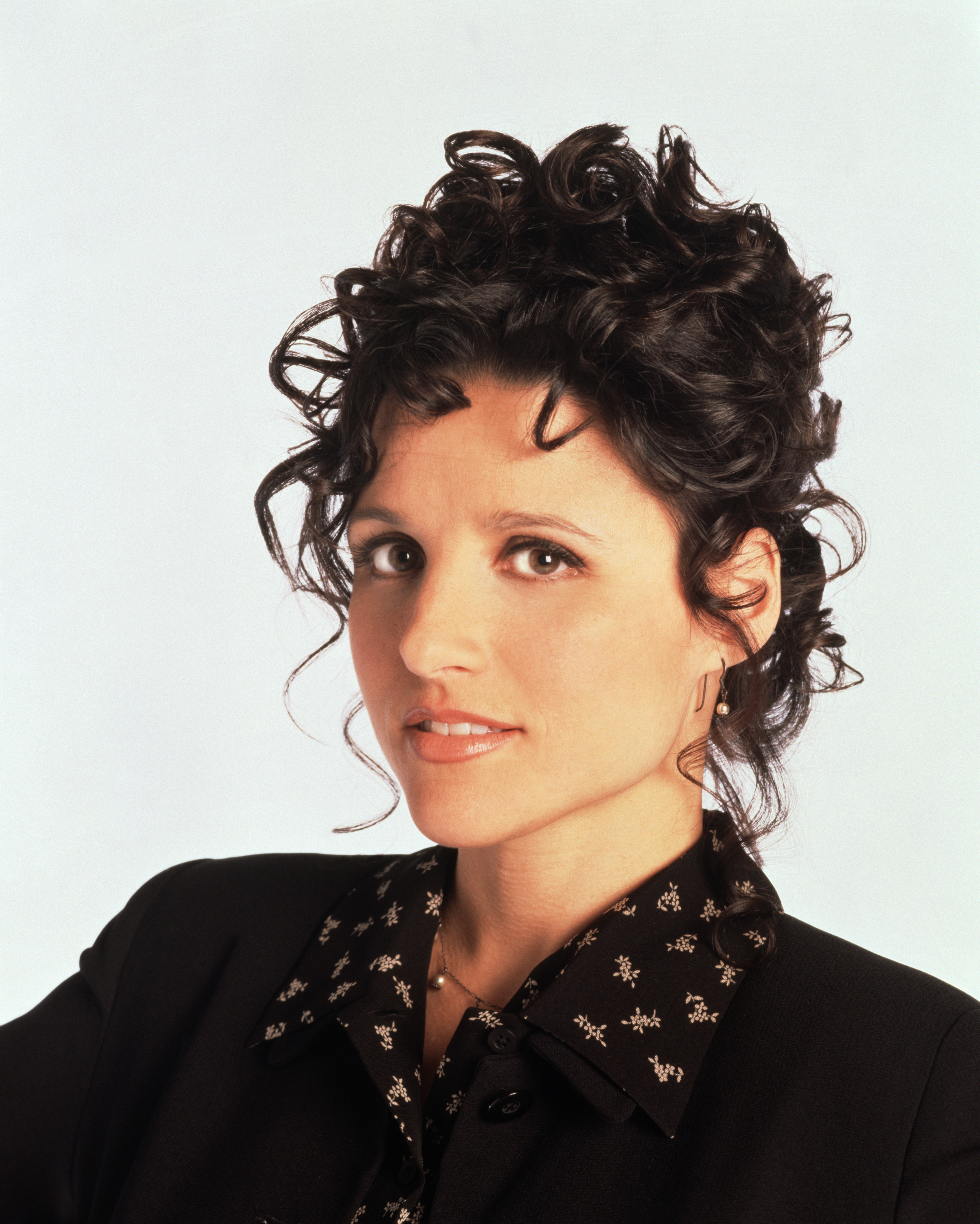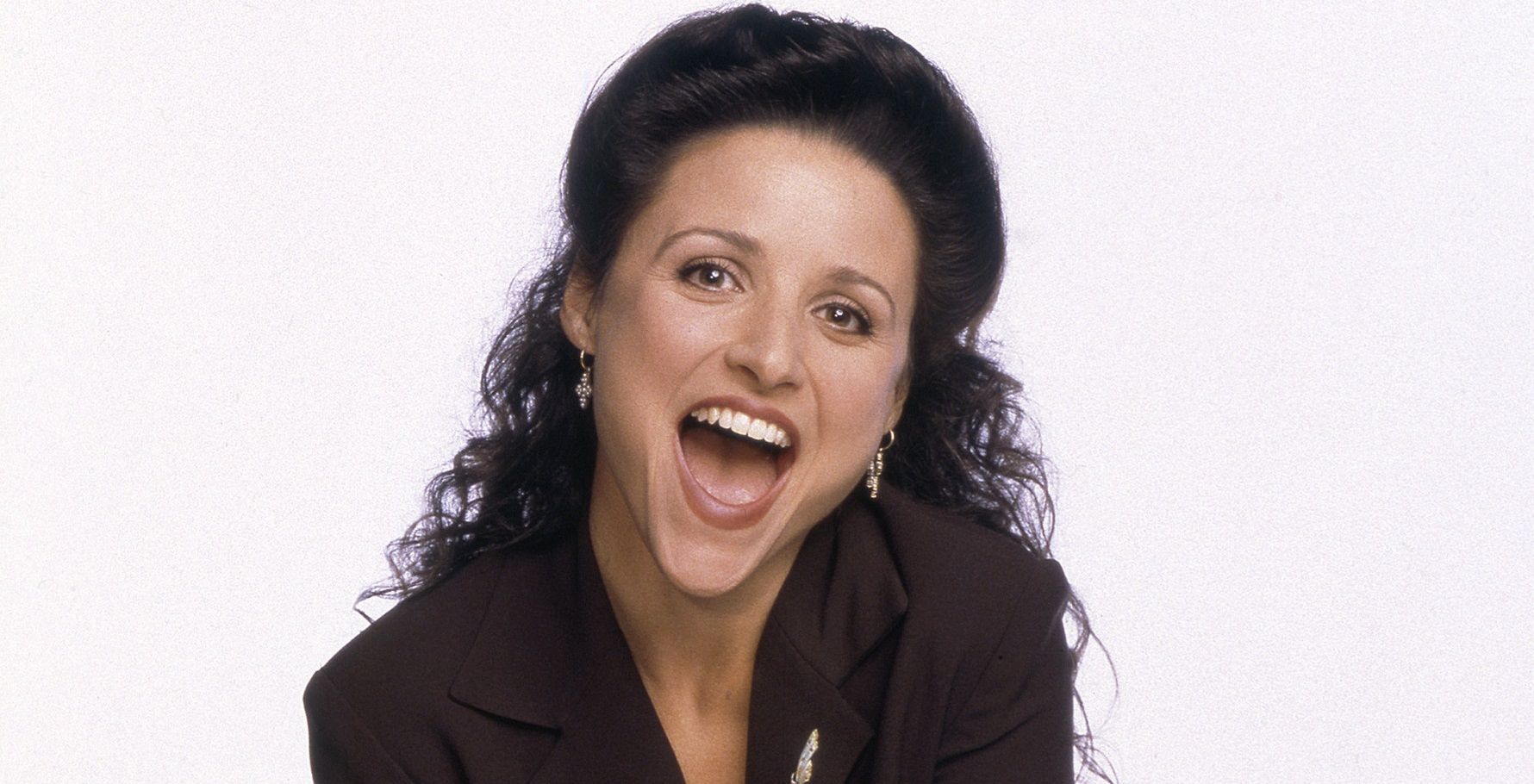Why Elaine Benes *Still* Matters: Seinfeld's Iconic Woman!
Can one character truly redefine the landscape of sitcoms? Absolutely. Elaine Benes, brought to life by the inimitable Julia Louis-Dreyfus, did just that, etching her name into the annals of television history as a force of comedic nature and a touchstone of female empowerment. Her time on Seinfeld wasn't just about delivering punchlines; it was about shattering expectations and creating a character who was as flawed and fabulous as the real women in the audience.
Elaine's journey on Seinfeld, which captivated viewers from 1989 to 1998, was more than just a series of quirky mishaps; it was a masterclass in character development. She was the antithesis of the saccharine sitcom stereotype, a woman who was intelligent, ambitious, and unapologetically herself. Her interactions with Jerry, George, and Kramer weren't just fodder for comedic gold; they were a reflection of the complexities of modern relationships, where friendship often blurred the lines of romance and sanity. Her professional aspirations, her romantic misadventures, and her unflinching personality made her a cultural icon, and this article will tell you how "Elaine Benes" changed the world.
| Attribute | Details |
|---|---|
| Name | Elaine Benes |
| Portrayed by | Julia Louis-Dreyfus |
| First Appearance | Season 1, Episode 5 ("The Stock Tip") |
| Occupation | Writer, Editor, J. Peterman Employee |
| Notable Traits | Witty, Sarcastic, Independent, Strong-willed, Prone to Eccentric Behavior |
| Relationships | Jerry Seinfeld (Ex-Girlfriend, Friend), George Costanza (Friend), Cosmo Kramer (Friend), Numerous Romantic Interests |
| Source | IMDb - Elaine Benes Character Page |
The genius of Elaine Benes lies in her multi-dimensionality. She wasn't just a "female character"; she was a fully realized individual with her own desires, flaws, and quirks. Her early appearances established her as more than just an ex-girlfriend lingering in the protagonist's life; she was a vital part of the group dynamic, holding her own against the often-absurd antics of Jerry, George, and Kramer. This transition from a supporting role to a central figure was a testament to the writers' vision and Louis-Dreyfus's exceptional performance.
The evolution of Elaine's character can be traced through her professional endeavors. From her early days at Pendant Publishing, where she navigated the treacherous waters of office politics, to her stint at the J. Peterman catalog, where she encountered a world of eccentric characters and outlandish product descriptions, Elaine's career was a microcosm of the challenges faced by women in the workplace. These experiences weren't just comedic fodder; they were a commentary on the gender dynamics of the time, highlighting the obstacles and absurdities that women often had to overcome in their professional lives. Even her brief entrepreneurial venture demonstrated her ambition and resourcefulness, though it, like many of her endeavors, ultimately met with a comedic downfall.
One cannot discuss Elaine Benes without acknowledging her unique relationship with each of the other main characters. Her dynamic with Jerry Seinfeld, her former flame, was a delicate balance of affection, exasperation, and playful banter. Their history added a layer of complexity to their friendship, creating moments of both warmth and tension. Elaine's interactions with George Costanza were marked by a shared cynicism and a tendency to engage in petty rivalry. They were often each other's confidantes, sharing their frustrations and anxieties, but also quick to point out each other's flaws and shortcomings. And then there was Kramer, the unpredictable neighbor whose antics often left Elaine bewildered and amused. Their interactions were a study in contrasts, with Elaine's grounded pragmatism clashing against Kramer's unbridled eccentricity. These relationships were not simply plot devices; they were the foundation upon which Elaine's character was built, revealing different facets of her personality and contributing to the show's overall comedic brilliance.
The catalogue of iconic Elaine Benes moments is a testament to her enduring appeal. The "Little Kicks" dance, a physical embodiment of awkwardness and self-consciousness, became a cultural phenomenon, instantly recognizable and endlessly imitated. The phrase "Yada Yada Yada," a linguistic shortcut that became synonymous with Seinfeld, originated with Elaine, showcasing her ability to distill complex situations into concise and hilarious pronouncements. Her romantic entanglements, often marked by disastrous dates and abrupt breakups, provided a constant stream of comedic fodder, highlighting her resilience and her willingness to laugh at her own misfortunes. From her obsession with Jujyfruits to her infamous encounter with the Soup Nazi, Elaine's moments are ingrained in the collective memory of Seinfeld fans, a testament to the character's lasting impact.
- Then Now Danny Devitos Young Photos Pop Culture Impact
- Scout Willis From Hollywood Royalty To Rising Star More
Elaine Benes's impact transcends mere entertainment; she left an indelible mark on popular culture, influencing the way female characters are written and perceived. She was a departure from the stereotypical sitcom wives and girlfriends, a woman who was intelligent, independent, and unapologetically flawed. She challenged societal expectations, defying traditional gender roles and paving the way for future generations of strong female characters on television. Many viewers saw Elaine as a symbol of female empowerment, identifying with her struggles and celebrating her triumphs. She resonated with women who were tired of being relegated to supporting roles, who wanted to see themselves represented as complex, multifaceted individuals.
The influence of Elaine Benes can be seen in countless television shows that followed Seinfeld. From the quick-witted protagonists of "30 Rock" to the independent women of "Parks and Recreation," many contemporary sitcoms feature strong female leads who owe a debt to Elaine's pioneering character. Her image and quotes have been featured on a wide range of merchandise, further solidifying her status as a cultural icon. She is frequently referenced in discussions about influential TV characters, a testament to her enduring relevance and the lasting impact she had on the television landscape.
To delve deeper into the world of Elaine Benes and the phenomenon of Seinfeld, several key episodes offer a compelling glimpse into her character development and the show's overall brilliance. "The Contest," which tackled the taboo subject of masturbation with its signature blend of wit and subtlety, showcased Elaine's competitive spirit and her willingness to push boundaries. "The Opposite," which highlighted George's newfound success through doing the opposite of his instincts, also featured Elaine's professional struggles and her growing disillusionment with the workplace. "The Marine Biologist," while primarily focused on George's tall tale, provided a glimpse into Elaine's compassionate side, as she attempted to help a whale in distress. And "The Finale," despite its controversial ending, served as a fitting culmination of Elaine's journey, showcasing her enduring friendships and her ultimately unchanged personality.
Julia Louis-Dreyfus's portrayal of Elaine Benes was nothing short of transformative. She brought a physicality and energy to the role that was both hilarious and endearing. Her impeccable comedic timing, her expressive facial expressions, and her ability to seamlessly transition between sarcasm and vulnerability made Elaine a truly unforgettable character. Louis-Dreyfus's performance earned her widespread critical acclaim, including multiple Emmy Awards, solidifying her status as one of the greatest comedic actresses of all time. Her dedication to the role and her understanding of Elaine's complexities elevated the character beyond simple caricature, creating a figure that was both relatable and aspirational.
Beyond the immediate impact on television and popular culture, Elaine Benes sparked broader conversations about gender roles, representation, and the changing landscape of comedy. She challenged the notion that female characters had to be either overtly feminine or aggressively masculine, demonstrating that a woman could be both intelligent and funny, vulnerable and strong. She paved the way for a more nuanced and authentic portrayal of women in media, inspiring a new generation of writers and creators to break down stereotypes and embrace complexity.
The enduring appeal of Elaine Benes lies in her relatability. Despite her often-absurd situations and her occasional eccentricities, she embodies many of the challenges and anxieties of modern life. Her struggles with relationships, her career frustrations, and her constant quest for self-improvement resonate with viewers of all ages and backgrounds. She is a reminder that it's okay to be flawed, to make mistakes, and to laugh at ourselves along the way. And in a world that often demands perfection, that message is more relevant than ever.
Elaine Benes the noun, an idea, the state of mind continues to thrive in discussions about the most groundbreaking and influential characters in television history, and there are several factors that contribute to her lasting presence in the cultural zeitgeist. Here are some possible considerations. From her memorable moments to her influence on other people, her legacy continued in many forms.
The influence of "Elaine Benes" is the impact that transcends entertainment. These are not just funny sketches, those moments are mirror of our society and they have social commentary. Elaine's character and her portrayal touched the nerve of our audiences and have made lasting mark.
Legacy of "Elaine Benes" is not only in the entertainment world, but she is a figure who represent the movement that empower women. She is a symbol of women's empowerment, because she has defied the stereotype. Her persona has been a way to express one's true self, and it has motivated many writers, creators, directors and artists, and it will continue to inspire them.
"Elaine Benes" is not only a fictional character, but it has become the idea. That includes all the traits, personal views, and the character that is unique and well portrayed. That uniqueness has been the way of inspiration for many artists.
The "Elaine Benes", that is noun has been a cultural reference in many forms of conversations, entertainment, etc. The phrase is referenced in casual conversations and is included in media and literature as well.
"Elaine Benes" is still loved and remembered. The show has ended but still "Elaine Benes" and the character has remained relevant, entertaining and educational for many.



Detail Author:
- Name : Claude Schamberger
- Username : robert95
- Email : walter.kristin@hotmail.com
- Birthdate : 1978-12-08
- Address : 1230 Nader Crossroad Kuhnshire, SC 83690
- Phone : +1 (551) 742-5557
- Company : Anderson Ltd
- Job : Counselor
- Bio : Molestias est voluptatibus et laudantium cum ea eum. In maiores labore sint velit laudantium. Molestiae non veniam magni. Rerum dolor sint veniam aliquid sunt est.
Socials
linkedin:
- url : https://linkedin.com/in/lilyan_williamson
- username : lilyan_williamson
- bio : Corrupti dolores qui enim enim harum.
- followers : 6915
- following : 1112
instagram:
- url : https://instagram.com/lilyan_id
- username : lilyan_id
- bio : Cupiditate saepe consequatur ea dolor eveniet. Est molestias beatae quis eius.
- followers : 3567
- following : 1910
twitter:
- url : https://twitter.com/lilyan.williamson
- username : lilyan.williamson
- bio : Sunt molestiae error aut ut quos aliquid sit. A et amet architecto aliquid nemo voluptas. Accusamus sapiente debitis aut. Sapiente ex omnis aut.
- followers : 395
- following : 243
facebook:
- url : https://facebook.com/lilyanwilliamson
- username : lilyanwilliamson
- bio : Pariatur est distinctio beatae odio optio numquam.
- followers : 808
- following : 907